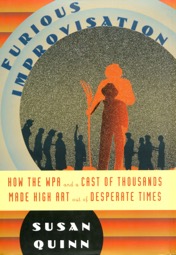 $9.99 on Kindle, Nook, Apple Books, Kobo, Google Play
$9.99 on Kindle, Nook, Apple Books, Kobo, Google PlayFurious Improvisation: How the WPA and a Cast of Thousands Made High Art out of Desperate Times by Susan Quinn (118,000 words, 21 illustrations)
Under the direction of Hallie Flanagan, a daring 5-foot dynamo, the Federal Theater Project managed to turn a WPA relief program into a platform for some of the most cutting-edge theater of its time. This unique experiment by the US government in support of the arts electrified audiences with exciting, controversial productions, created by some of the greatest figures in 20th century American arts — including Orson Welles, John Houseman and Sinclair Lewis. Plays like Voodoo Macbeth and The Cradle Will Rock stirred up politicians by defying segregation and putting the spotlight on the inequities that led to the Great Depression.
Furious Improvisation brings to life the challenges of this desperate era when Franklin Delano Roosevelt, Eleanor Roosevelt and the tough-talking idealist Harry Hopkins furiously improvised programs to get millions of hungry, unemployed people back to work. Quinn’s compelling story of politics and creativity reaches a dramatic climax with the entrance of Martin Dies and his newly formed House Un-American Activities Committee, which turned the Federal Theatre Project into the first victim of a Red scare that would roil the nation for decades to come.
“Insightful, judiciously selective history of the Federal Theatre Project (FTP), the most controversial branch of the New Deal’s Works Progress Administration (WPA)... With careful attention to the underlying political and cultural issues, Quinn cogently retells this sad story of ‘a brief time in our history [when] Americans had a vibrant national theatre almost by accident.’” — Kirkus
“[A] fascinating new book that describes a rare happy marriage between art and government.” — Maureen Corrigan, Fresh Air, National Public Radio
“Quinn does a superb job of recounting the rise and fall of the Federal Theatre Project, a wing of FDR’s WPA meant to employ playwrights and actors while providing diversion and inspiration for Depression-ravaged Americans... Quinn describes eloquently and artfully... a not-so-distant time when a nation bled and great artists rushed as healers into the countryside.” — Publishers Weekly
“Quinn skillfully weaves together the cultural, political, personal and theatrical events that shaped the course of the [Federal Theatre Project]... Quinn enriches the prevalent narrative of FTP history... with her thorough analysis of key events outside the theatres.” — Theatre Survey
“An energetic and adeptly detailed account of the remarkable achievements of the Federal Theatre Project... Much more than the sum of its fascinating parts.” — Booklist
“[A]n excellent book, a model of narrative history...” — Scott Eyman, The Observer
“Quinn’s well-written narrative is both fascinating and frightening as politics and idealism come to metaphorical blows with the rise of Martin Dies.” — Library Journal
“Susan Quinn has gifted us with a key moment in the history of F.D.R’s New Deal. Especially thrilling and revelatory is the work of the Arts Project of the WPA. Not only were there rakes and shovels, jobs and food for family, there was exhilarating and hopeful theatre, music, and painting, lifting our spirits. They gave us all hope.” — Studs Terkel
“This fine book combines elements of political history, theater lore, and a saga of social justice. In showing us a rare triumph of bold artists in league with brave public servants, Quinn rescues the idea that the imagination and government can be friends instead of strangers. Our times are desperate, too, and Furious Improvisation comes at just the right moment.” — James Carroll, author of House of War and Constantine’s Sword
“Susan Quinn’s Furious Improvisation is a fascinating account of a fleeting moment in American history when the US government felt some obligation to provide work for its more indigent citizens, including artists. Hallie Flanagan, the heroine of this book, emerges as a true saint of the theatre — passionate, visionary, and inspired. Well written and thoroughly engrossing.” — Robert Brustein, Founder, Yale Repertory Theatre and American Repertory Theatre
“With a cast of period icons ranging from Harry Hopkins to Orson Welles, Quinn’s fast-paced, highly readable narrative exposes the myriad ‘isms’ — racism, sexism, communism, fascism — defying the birthright of a young democracy whose survival was still very much in question. A provocative reminder of how consistent national conflicts remain.” — Diane McWhorter, author of Carry Me Home
“Anyone interested in how theatre can make a difference in the world should read this book. Susan Quinn inspires us with the courage of Hallie Flanagan and her fellow artists, showing how theatre can be both life sustaining and dangerous — and have a huge impact on the political landscape.” — Tina Packer, Founder of Shakespeare & Company



